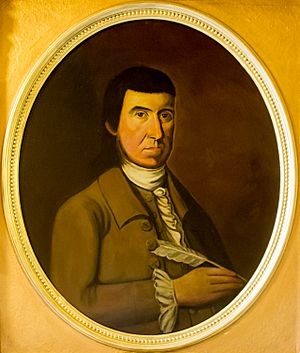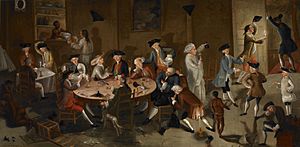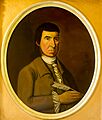Nicholas Cooke facts for kids
Quick facts for kids
Nicholas Cooke
|
|
|---|---|

Nicholas Cooke
|
|
| 37th Governor of the Colony of Rhode Island and Providence Plantations | |
| In office 1775–1776 |
|
| Preceded by | Joseph Wanton |
| Succeeded by | himself as governor of the State of Rhode Island and Providence Plantations |
| 1st Governor of Rhode Island | |
| In office 1776–1778 |
|
| Preceded by | himself as governor of the Colony of Rhode Island and Providence Plantations |
| Succeeded by | William Greene |
| 41st and 43rd Deputy Governor of the Colony of Rhode Island and Providence Plantations | |
| In office 1768–1769 |
|
| Governor | Josias Lyndon |
| Preceded by | Joseph Wanton, Jr. |
| Succeeded by | Darius Sessions |
| In office 1775–1775 |
|
| Governor | Joseph Wanton |
| Preceded by | Darius Sessions |
| Succeeded by | William Bradford |
| Personal details | |
| Born | February 3, 1717 Providence, Colony of Rhode Island, British America |
| Died | September 14, 1782 (aged 65) Providence, Rhode Island, U.S. |
| Resting place | North Burial Ground |
| Spouse | Hannah Sabin |
| Occupation | Sea captain, merchant, ropemaker, politician, governor |
Nicholas Cooke (February 3, 1717 – September 14, 1782) was a very important leader in Rhode Island. He served as governor during the exciting time of the American Revolutionary War. First, he was governor of the Colony of Rhode Island and Providence Plantations. Then, after Rhode Island became a state, he continued as its first governor.
Cooke was born in Providence, Rhode Island, a town by the sea. He started his career as a sea captain, sailing ships. Later, he became a successful merchant and ran businesses like a distillery and a rope-making company. He is even shown in a famous painting from the 1750s called Sea Captains Carousing in Surinam.
Cooke became involved in politics in 1752. He was elected as an "assistant" from Providence. In 1768, he became the Deputy Governor of the Rhode Island colony. When the war with Great Britain began, he was elected deputy governor again in 1775. The governor at the time, Joseph Wanton, supported the British. Because of this, Wanton was removed from his position, and Cooke took over as governor in November 1775.
In May 1776, Cooke was re-elected governor. During this time, a huge event happened: Rhode Island officially broke away from Great Britain. This happened two months before the other 13 American colonies signed the United States Declaration of Independence. Cooke faced many challenges during the war, especially when the British took over Newport. He decided not to run for re-election in 1778. He passed away four years later in Providence.
Contents
Who Was Nicholas Cooke?
Nicholas Cooke was born in Providence, Rhode Island, on February 3, 1717. His parents were Daniel Cooke and Mary Power. When he was young, he worked on ships and became a ship captain. This led him to become a successful merchant. He also owned a business that made ropes and a distillery. After earning a lot of money, he bought land in Rhode Island, Massachusetts, and Connecticut.
Cooke first entered politics when he was 35 years old. He was elected as an "Assistant" from Providence in 1752. He was elected to this role three more times over the next seven years.
Cooke in a Famous Painting
In the mid-1750s, a painter named John Greenwood visited Suriname. He painted a funny scene of 22 sea captains and merchants in a tavern. Nicholas Cooke is believed to be the man wearing a hat, sitting at the back of the table, facing right, and smoking a pipe.
His Role at Brown University
In 1766, Cooke became a trustee for Rhode Island's new college, which later became Brown University. He served in this role until he died. He represented the Beneficent Congregational Church, where he had been a member since 1747.
Standing Up to Great Britain
In 1768, Cooke became the deputy governor under Governor Josias Lyndon. They both left their jobs after one year. As problems with Great Britain grew, Cooke became the head of the Providence Committee of Inspection. His job was to make sure the town followed the rules set by the Continental Congress. These rules included stopping the slave trade, not buying tea, and stopping all trade with Britain. They also encouraged people to sell goods at fair prices and avoid expensive shows or funerals.
In May 1775, Cooke was again elected deputy governor. Joseph Wanton was elected governor for the seventh time. However, Wanton did not want to break away from Great Britain. The General Assembly, on the other hand, strongly supported independence. They listed four reasons why Wanton was not fit to be governor. They stopped him from taking his oath of office. Wanton refused to create an army, sign officer commissions, or take his oath.
Wanton tried to explain himself in a letter, but it didn't work. He was suspended from his job without a trial. Cooke became the acting governor. Wanton was officially removed from office on November 7, 1775. Cooke then became the governor, with William Bradford as deputy governor. Cooke finished Wanton's term and was then elected for two more one-year terms.
Nicholas Cooke's Time as Governor
As governor, Cooke faced many challenges because of the war. One of his first actions was to move the colony's important items, like treasures and records, from Newport to Providence. This was because Newport was very exposed to attacks.
Preparing for War
The Assembly passed laws to raise and equip troops. They set pay for officers and soldiers. They also made sure the army had weapons, tents, and food. A Committee of Safety was chosen, and Nathanael Greene became a Brigadier General in the Army of Observations. Two ships were also prepared to protect the colony's trade. They were put under the command of Abraham Whipple, who was famous for leading the Gaspee raid.
Post offices and mail riders were set up to help communication between the colonies. A rule was made that every able man in the colony had to have his own weapons and ammunition. On September 15, 1775, the General Assembly decided to build an American fleet as soon as possible. This was the start of the American Navy. It was led by Admiral Esek Hopkins, who was the brother of former Governor Stephen Hopkins.
Newport became empty as enemy ships sailed freely nearby. A law was also passed to encourage making saltpeter and gunpowder. These were needed for muskets and artillery. In January, Cooke sent a message to Congress. He explained how exposed Rhode Island was, with its long coastline and hostile fleet in its waters. Cooke listed all the efforts Rhode Island had made and asked for help from the other colonies.
Rhode Island Declares Independence
In May 1776, Cooke won the election to become governor. At the same time, the most important event of his time as governor happened. On May 4, the Assembly met in Providence. They passed "the last important act in the colonial history of Rhode Island." This was Rhode Island's own Declaration of Independence from Great Britain. This happened a full two months before the 13 colonies signed the United States Declaration of Independence in Philadelphia.
This act canceled a previous promise of loyalty to the King. It declared that the King's name and power were no longer valid in Rhode Island. Courts would no longer be called the King's Courts. All official papers would now be in the name of the governor and the colony. This act was written by Colonel Jonathan Arnold. It passed easily in the Upper House and with only six votes against it in the Lower House. The phrase "God save the King" was officially replaced with "God save the United Colonies." The first action after this local independence was to give instructions to Stephen Hopkins and William Ellery. They were Rhode Island's two delegates to the Continental Congress.
In late July 1776, the government's official name was changed by the General Assembly. It became "The State of Rhode Island and Providence Plantations." The meeting notes ended with the words "God save the United States."
Newport Captured by British Forces
The August meeting of the Assembly was the last one held in Newport for four years. This was because British forces were about to take over Aquidneck Island (Rhode Island). In December 1776, British ships and troops arrived near Block Island. They sailed to Newport with about 6,000 soldiers. Calls for help went out to other states, even as far as New Hampshire. Women and children in towns by the sea had already been told to move inland. Farm animals were moved off the larger islands. Rhode Island had about 700 soldiers on the island when the British landed. After a night of taking supplies, the British troops marched into Newport on December 8. They were led by General Clinton. The Rhode Island troops left the island and moved to Tiverton and Bristol. Help came from neighboring states, and the Americans took strong positions on both sides of the bay.
Providence was also used for military purposes. The college classes were stopped. The building was used as a barracks for soldiers, and later as a military hospital. General Benedict Arnold was sent by Washington to Providence in January 1777. He came to help defend Rhode Island. The Marquis de Lafayette also joined the American cause around this time.
Cooke desperately needed more soldiers. He ordered a new group of soldiers to be raised in Rhode Island. Washington was worried this would interfere with getting soldiers for other groups. Washington wrote two serious letters about it. But when Cooke explained the situation, Washington finally approved the plan. He thanked Rhode Island for its efforts.
Cooke's Final Years as Governor
In May 1777, the same state officers were elected. However, William Channing replaced Henry Marchant as Attorney General. Marchant then became Rhode Island's third delegate to Congress. For the next year, Cooke dealt with the many difficult issues caused by the war.
After almost three years as a wartime governor, Cooke was tired of his responsibilities. He decided to retire from office in May 1778. William Greene, the son of a former colonial governor, replaced him. Cooke's deputy governor, William Bradford, also chose not to run for re-election. Both men were publicly thanked by the General Assembly for their "patriotic zeal, firmness, and intrepidity." Historian Thomas W. Bicknell said that Cooke's service showed his "excellent good sense and wise judgment."
Nicholas Cooke passed away on November 14, 1782. He was buried in the North Burial Ground in Providence.
Nicholas Cooke's Family
In 1740, Nicholas Cooke married Hannah, the daughter of Hezekiah Sabin. They had 12 children together. One of his descendants was the Honorable George L. Cooke of Providence. His son, Joseph S. Cooke (born 1746), was a ship captain. He made several trading trips to Africa and the West Indies. His daughter Sarah (1755–1843) married Colonel Jeremiah Olney of the Continental Army on April 26, 1780. They had one child, Mary T. Olney (1799–1878).
 | James Van Der Zee |
 | Alma Thomas |
 | Ellis Wilson |
 | Margaret Taylor-Burroughs |





